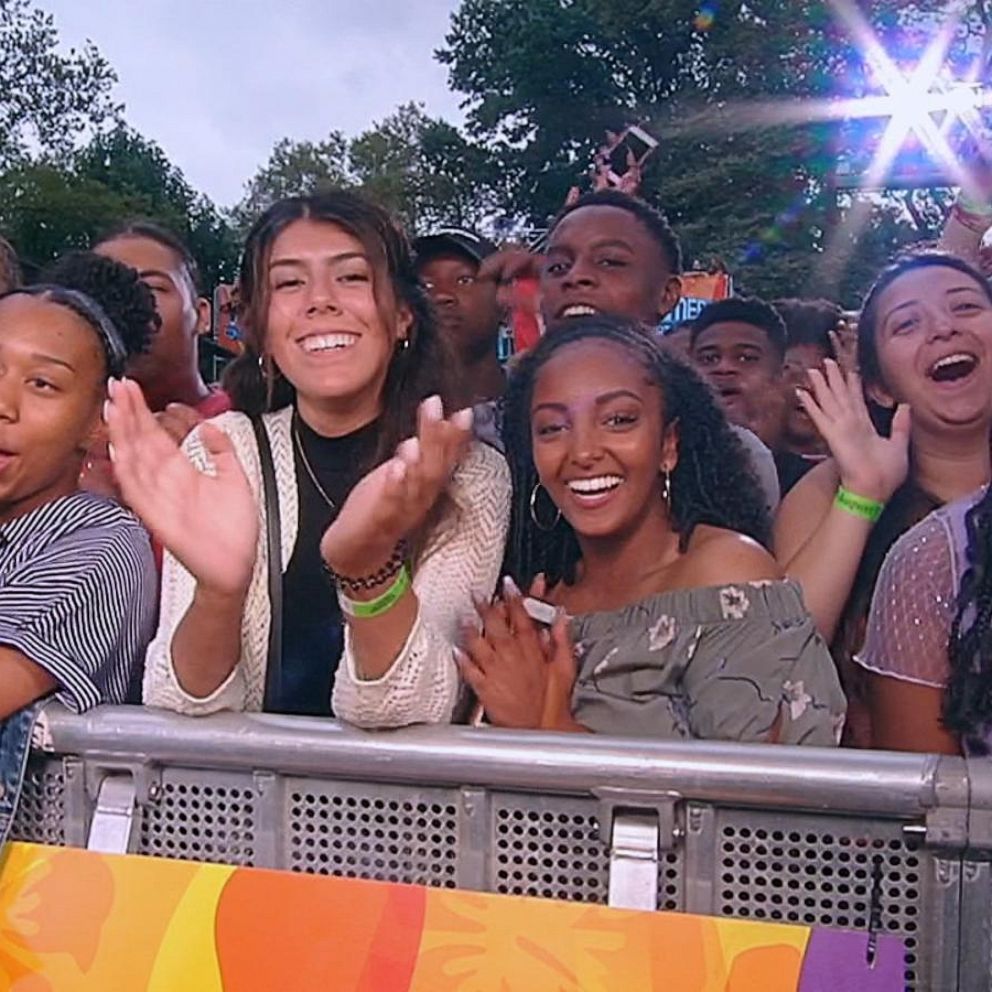Chance the Rapper on why he donated $1M for mental health: 'We all can be affected by it'
"We all know people that are affected by it. We all can be affected by it."

Chance the Rapper is known for being a high-profile advocate of public schools in his hometown of Chicago, but he is also using his platform to take on the issue of mental health.
“Mental health and mental wellness are extremely important to me and everybody because we all know people that are affected by it,” Chance said Friday on “Good Morning America.” "We all can be affected by it.”
The artist, whose real name is Chancelor Bennett, committed last year to donating $1 million to health services in Chicago through SocialWorks, his nonprofit organization.

SocialWorks also launched its own mental health initiative, My State of Mind, which provides grants to mental wellness service providers and is working to create an "inclusive guidebook" of mental health services in the Chicago area, according to SocialWorks.
Chance has spoken out in the past about dealing with anxiety and how mental health was not a "thing that we talked about" during his childhood.
"I think anxiety is also something that I'm just now being exposed to," he told Complex magazine in 2017. "A really big conversation and idea that I'm getting introduced to right now is black mental health. 'Cause for a long time that wasn't a thing that we talked about. I don't remember it. I don't remember people talking about anxiety."
"I don't remember, when I was growing up, that really being a thing," he said.

Last year the rapper was applauded for using his social media following to urge people to be patient and supportive to people with mental illness. Chance's tweet on the topic went viral with more than 230,000 likes.
Across the country, millions of people are affected by mental health conditions every year, everything from anxiety to depression and post-traumatic stress disorder (PTSD), according to the National Alliance on Mental Illness (NAMI), a grassroots mental health organization.
While taking care of one's mental health is a big task, there are small ways we can all protect and prioritize it every day.
Here are six ways to make your mental health a priority.
1. Schedule a therapy session like it's a workout
If you are able to see a mental health professional in person, schedule it like you would any other important meeting or event, and stick to it.
Apps also offer a new way to approach therapy.
Some apps allow you to talk to a mental health professional remotely, while others offer help with everything from meditation to quitting a bad habit
Here are seven mental health-focused apps to try.
2. Do an actual workout
There's a reason the saying "sweat it out" is still around.
If exercise becomes a regular part of your life, it is medically proven to help keep those keep poor mental health at bay.
It has been shown that in people who are depressed, the hippocampus — the part of the brain that regulates mood — is smaller. Regular exercise can promote nerve cell growth in this part of the brain, which can improve brain function, and therefore a person's mood, research shows.
The key is to pick an activity that you won't dread doing every day and one that you can continue doing for the long-haul, experts say.
Even better, schedule a workout with a friend or loved one so you can sweat and connect together.
3. Back away from your phone
Taking time to disconnect from phone calls, emails and social media can be hard, but it's so worth it.
Putting your phone down for just an hour or two a day — or going big and shutting it off for a day or a weekend — can help give your mind a break, help you feel more in charge of your own time and give you time to do things that fill you with joy.
Here is a step-by-step guide on how to unplug from Catherine Price, author of "How to Break Up With Your Phone."
4. Go to sleep 10 minutes earlier
Allowing yourself more sleep, even if it's just a few minutes each night, is one of the best gifts you can give yourself, research shows.
The average amount of sleep Americans get each night keeps dropping. That reduced amount of sleep can lead to social problems and increased feelings of loneliness, according to a recent study, which found that losing sleep can impair the parts of the brain related to socialization.
To increase the amount of sleep you're getting, plan your day backwards. Start with noting the time you need to go to sleep, and then take note of how much time you need after you stop activities to get ready for bed. You can then plan from there.
Create a ritual for yourself around bedtime, whether it's taking a bath, reading a book, meditating or just having time to be still. Keep your phone out of your room and your TV off before bed, too.
5. Use your vacation days
Using paid vacation days from your employer can decrease stress, improve quality of sleep and lower the risk of heart disease, studies show.
Yet, American employees forfeited 212 million paid vacation days in 2017, according to Project: Time Off, a coalition of organizations working to change Americans’ thinking and behavior around vacation time.
Americans who take all or most of their vacation days to travel report being 20 percent happier with their personal relationships and 56 percent happier with their health and well-being than those who travel with little or none of their vacation time, the coalition found in its State of American Vacation 2018 report.
To maximize the vacation days you have earned, experts recommend requesting time off as far in advance as possible. Also think about your time off as a day here and there, instead of having to take it in larger spaces of time, like a week.
6. Stock your kitchen with brain foods
What you choose to eat affects not just your waistline, but how you think and feel, according to a growing body of research.
Overall healthy eating — particularly fruits, vegetables, healthy fats and whole grains — has been linked in studies that found they lower risk of depression and even suicide.
Nutrition also improves the immune system, which subsequently influences our mood and risk of depression.
Consider eating foods like salmon, dark chocolate, berries and spinach and kale as part of your daily diet.
If you or a loved one are in need of additional mental health resources, SAMHSA’s National Helpline -- 1-800-662-HELP (4357) -- is a free, confidential, 24/7, 365-day-a-year treatment referral and information service (in English and Spanish) for individuals and families facing mental and/or substance use disorders.





